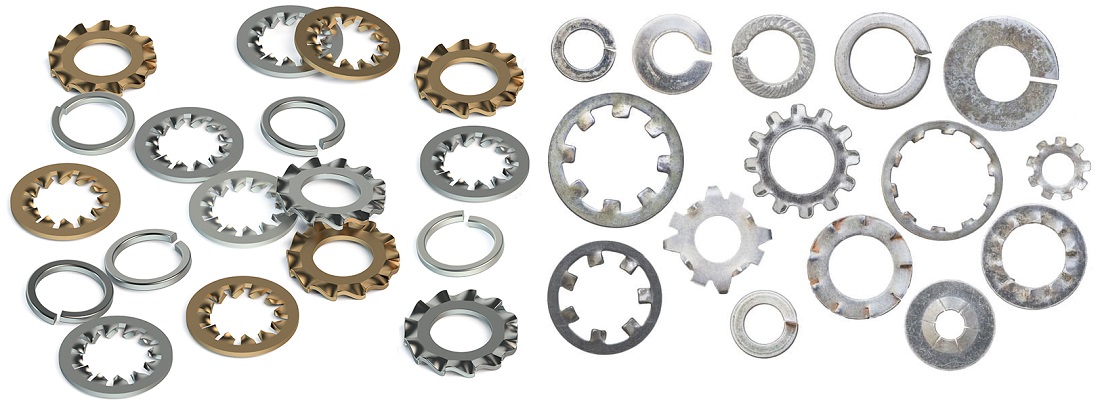Mechanical Products Parts:
Lock Washers
Lock washers are mechanical fasteners engineered to prevent nuts and bolts from loosening due to vibrations or dynamic loads. Typically made of metal, they feature serrations, helical grooves, or teeth on their inner or outer edges. When installed between the nut and the surface, they generate friction that resists rotational movement, ensuring the fastener remains tight over time. This added security enhances the stability and integrity of the connection. Lock washers are widely used in industries such as automotive, construction, and machinery, where maintaining secure fastening is critical. Common types of lock washers include split washers, toothed washers, and wedge locking washers, each featuring a unique locking mechanism:
- Split Washers: Designed with a split on one side and a raised lip, these washers create extra tension when tightened against a nut, helping to prevent loosening.
- Toothed Washers: These washers feature notches that lock into the surface and nut, providing a firm grip.
- Wedge Lock Washers: Sold in glued pairs with internal ridges, these washers lock tightly together during installation to create a secure hold.
Lock washers are typically used with nuts, bolts, and other fasteners to distribute pressure evenly and prevent fasteners from driving into the surfaces being joined. They are particularly effective in high-vibration environments, such as automotive, aircraft, and marine applications, where they help maintain a tight connection.
Types of Lock Washers
Lock washers come in two main types: spring-action (split) washers and tooth washers.
- Split Lock Washers: These helical-shaped washers exert a spring force on the fastener when tightened, increasing friction and resistance to movement. They are ideal for applications with smaller loads.
- Internal Tooth Lock Washers: Designed with teeth that bite into the nut or screw head and the contact surface, they work well for smaller screws, especially in electrical grounding.
- External Tooth Lock Washers: These have teeth on the outer edge, providing a stronger hold by biting into a larger surface area, making them ideal for larger screws.
Key Features and Benefits
- Enhanced Security: Lock washers prevent fasteners from loosening due to vibration or torque, reducing the risk of mechanical failure.
- Durable Construction: Made from materials like alloy steel, carbon steel, stainless steel, and with zinc finishes, lock washers offer strength and corrosion resistance.
- Cost-Effective Maintenance: By securing fasteners and preventing loosening, lock washers extend the lifespan of machinery, reducing the need for frequent maintenance.
Usage and Compatibility
- Single Use: Lock washers are typically designed for one-time use. Once compressed, they lose some of their spring force, making them less effective if reused.
- Compatibility: Lock washers are designed to work with a wide variety of bolts, offering extra security in diverse applications.
With their balance of flexibility and strength, lock washers are a long-lasting solution for securing bolts in various industrial settings. They play a crucial role in preventing fastener loosening and ensuring reliable connections under demanding conditions.
